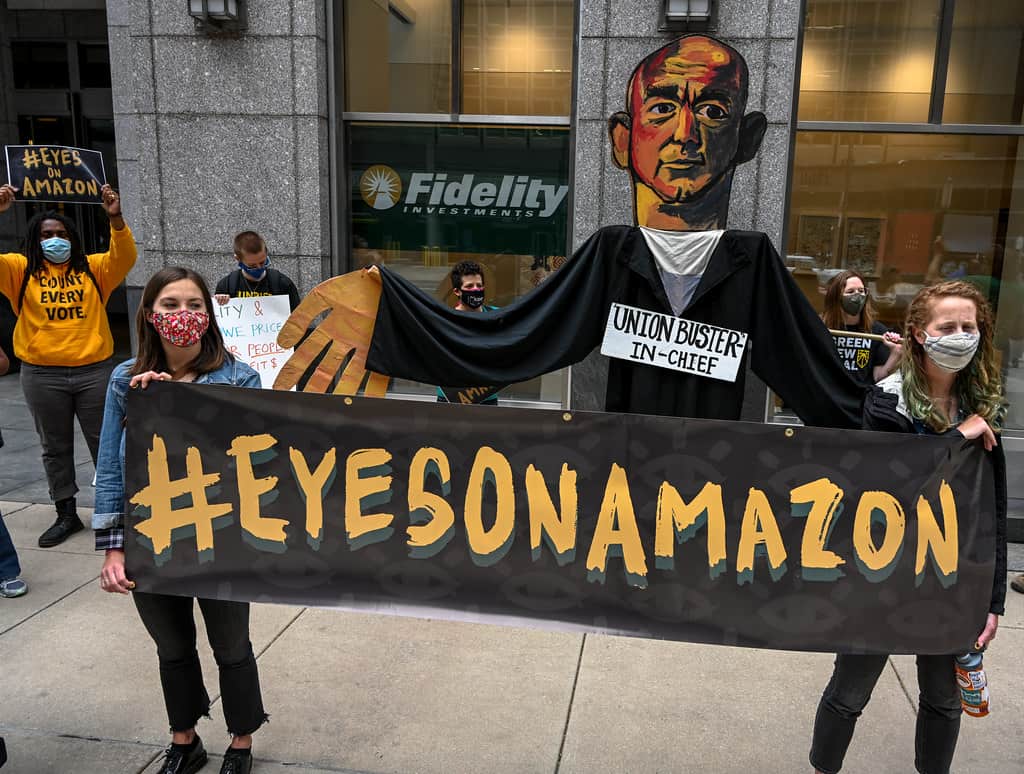Luke Hinrichs is a student at Harvard Law School.
In today’s news and commentaries, NLRB seeks to compel Amazon to collectively bargain with San Francisco warehouse workers, DoorDash delivery workers and members of Los Deliveristas Unidos rally for pay transparency, and NLRB takes step to drop lawsuit against SpaceX over the firing of employees who criticized Elon Musk.
The National Labor Relations Board (NLRB) issued a complaint against Amazon on Monday alleging the company violated Section 8(a)(1) and (5) of the National Labor Relations Act by refusing to bargain collectively with the Teamsters after a majority of employees at a San Francisco Amazon warehouse designated the union as their exclusive representative last fall. The complaint, issued under Trump’s acting NLRB general counsel, rests on the Cemex Construction Materials Pacific precedent established during Biden Administration to request an order that compels Amazon recognize and bargain in good faith with the Teamsters as the exclusive bargaining agent for a reasonable period of time.
Delivery workers rallied outside of DoorDash’s New York City headquarters to protest the company’s alleged wage theft and exploitation. The organizing effort comes after the New York Attorney General’s office secured a $16.75 million settlement against DoorDash because the company was illegally using customer tips to offset a base pay rate that it already offered to workers. DoorDash did not acknowledge any wrongdoing and the settlement only covered the period from 2017 to 2019. According to Los Deliveristas Unidos nonpayment of earned wages, unjust use of pay algorithms, and abrupt deactivations of delivery worker’s access continue to be systemic issues. The workers and organizers of the rally are advocating for the passage of a City Council bill that would require third-party food delivery services and third-party courier services to provide food delivery workers with information on how they are calculating the workers’ pay.
In January 2024, the NLRB filed a complaint against SpaceX alleging the company illegally interrogated and fired employees over their involvement in an open letter criticizing Elon Musk. SpaceX responded by suing the NLRB, claiming that the agency’s structure is unconstitutional. Since then, an injunction has paused the NLRB’s case against the company as the constitutional challenge works its way through the court system. During the Biden Administration, the NLRB also rejected SpaceX’s argument that the agency has no jurisdiction over the company and that the allegations should instead be heard by the National Mediation Board, which oversees railways and airlines that transport passengers. On Wednesday, Trump’s acting NLRB general counsel reversed course and took a decisive step to drop the NLRB’s case against SpaceX by entering a joint court filing requesting that the Mediation Board consider whether the agency has jurisdiction rather than the NLRB.






Daily News & Commentary
Start your day with our roundup of the latest labor developments. See all
February 17
San Francisco teachers’ strike ends; EEOC releases new guidance on telework; NFL must litigate discrimination and retaliation claims.
February 16
BLS releases jobs data; ILO hosts conference on child labor.
February 15
The Office of Personnel Management directs federal agencies to terminate their collective bargaining agreements, and Indian farmworkers engage in a one-day strike to protest a trade deal with the United States.
February 13
Sex workers in Nevada fight to become the nation’s first to unionize; industry groups push NLRB to establish a more business-friendly test for independent contractor status; and UFCW launches an anti-AI price setting in grocery store campaign.
February 12
Teamsters sue UPS over buyout program; flight attendants and pilots call for leadership change at American Airlines; and Argentina considers major labor reforms despite forceful opposition.
February 11
Hollywood begins negotiations for a new labor agreement with writers and actors; the EEOC launches an investigation into Nike’s DEI programs and potential discrimination against white workers; and Mayor Mamdani circulates a memo regarding the city’s Economic Development Corporation.